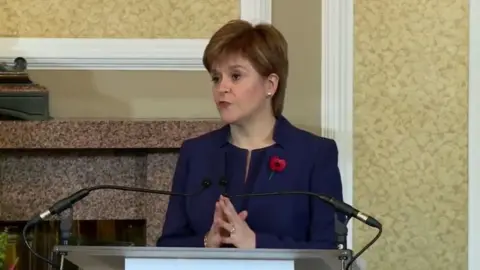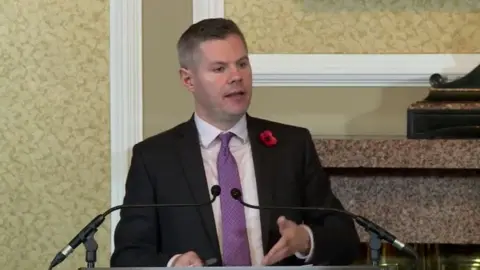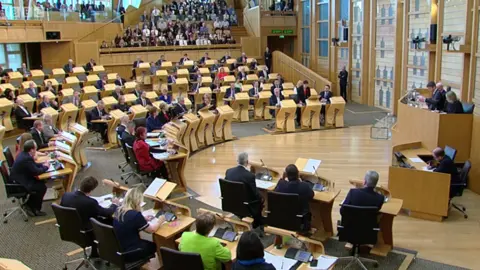Nicola Sturgeon sets out Scottish income tax options
 Scottish Government
Scottish GovernmentThe Scottish government has set out a range of options for future income tax rates ahead of budget negotiations.
First Minister Nicola Sturgeon published a discussion paper on rates, posing "tough questions" about rises.
The paper details the potential impact of tax plans advanced by the SNP and by opposition parties, and sets out tests by which these can be judged.
Finance Secretary Derek Mackay will now open talks with other parties in a bid to build a majority for his budget.
Launching the paper, Ms Sturgeon said "we must consider if the time has come for those who earn the most to pay a modest amount more".
It lays out a series of tests by which future policy should be judged, including the amount of money that would be raised, whether or not policies would protect low earners and help tackle inequality, and the potential impact on business and the economy.
'Responsible and progressive'
Holyrood took control over income tax rates and thresholds in 2016. Ministers have so far opted not to change the basic rate of tax, but varied the threshold at which the higher 40p rate kicks in.
MSPs voted in favour of the principle of raising taxes to raise funds for public services in September, although SNP members abstained from that vote.
Ms Sturgeon said the discussion paper would "aid and inform" a discussion between parties on tax rates ahead of budget negotiations - stressing that all parties would need to compromise in order to strike a deal.
 Scottish Government
Scottish GovernmentEach party has put forward a range of proposals, with all barring the Greens currently suggesting maintaining the current three-band system, but with changes to rates and thresholds.
However, few of these plans satisfy the four tests set out by Ms Sturgeon, and while her paper analyses the various party proposals it also sets out four "alternative approaches" which could instead be pursued.
These include having anything up to six bands, an approach that the first minister said could potentially be "more progressive".
Three of the four include a 50p top rate, and incremental changes to others.
The SNP has previously backed a 50p top rate of tax UK-wide, but at that point rejected doing so north of the border alone unless powers over tax avoidance were also strengthened.
The party's manifesto for the 2016 Holyrood elections proposed freezing the basic rate of income tax for the duration of the current parliament, but ministers have accepted they will have to make concessions in order to pass a budget.
Ms Sturgeon did highlight, however, that the SNP's manifesto proposals won more support than any others, saying that if her party was ready to compromise then others could not stick "rigidly" to their previous proposals either.

What has been the reaction to the proposals?

The options paper featured heavily at First Minister's Questions later on Thursday, with Scottish Conservative leader Ruth Davidson challenging Ms Sturgeon to commit to an independent economic assessment of her tax proposals.
And she raised concerns that any increase in taxation would slow economic growth.
Ms Davidson said: "We don't think it's right that any Scot earning more than £24,000 should have to pay more.
"The bottom line here is about getting growth and we are lagging behind. Scotland's economy is currently growing a third of the rate of the UK."
But the first minister stressed the need for balance, saying: "We need to look at this from the point of view of what kind of country do we want to be, what kind of economy do we want to have and what kind of society do we want?"
Scottish Labour's Jackie Baillie said she welcomed a focus on progressive taxation, but said the government's tax options would not be enough to end austerity.
She said: "To end austerity you need to raise more than £800m in revenue over the next two years, that's before we consider additional commitments.
"Yet the government's proposals published today in the tax paper raises a maximum of £290m."
Greens co-convener Patrick Harvie, whose party backs an overhaul of income tax rates and bands, said his party's proposals for a "fairer range of rates and bands is the only serious option left standing".
The Scottish Lib Dems have also backed rises, calling for a 1p increase in income tax to raise funds for education.
The Federation of Small Businesses said it "seems obvious" that Ms Sturgeon was "softening the ground for an increase", and that it was "as yet unconvinced that taking more through income tax is the right move for the country".
